hankyoreh
Links to other country sites 다른 나라 사이트 링크
[Reportage] Seongju’s farmers worry that THAAD will threaten their livelihoods
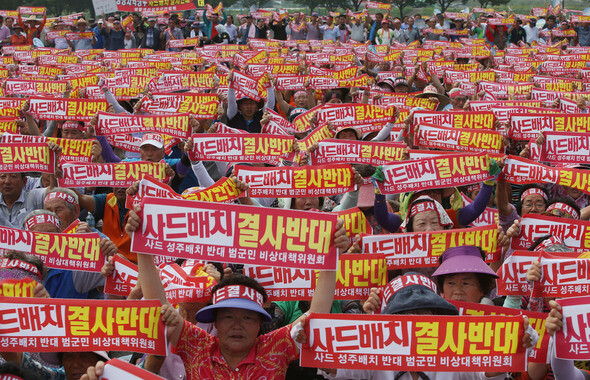
On July 13, a dozen residents of Seongsan Village in Seongju County, North Gyeongsang Province, were talking at their local community center. The subject of conversation was the announcement by South Korea’s Defense Ministry that Seongju County had been chosen as the site for deployment of the THAAD missile defense system.
“If THAAD is so great, tell the Defense Minister to put it in front of his parents’ house,” one resident said.
“We’re going to have to lie down on the road to keep them from bringing THAAD here,” another said.
“How is it that they were talking about Chilgok and then switched to Seongju all of a sudden?” a third said. Chilgok, like Seongju, is a county in North Gyeongsang Province.
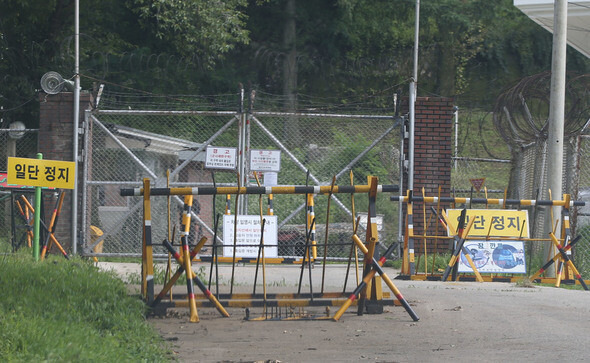
When I inquired about the location of Seongsan, where THAAD is supposed to be deployed, the residents all pointed to a hill in front of the village center.
“Take a look at that, will you?” one of the residents shouted. “It‘s not even 500 meters away from the village. It’s right in front of us.”
“THAAD is supposed to let off strong electromagnetic waves. If they put that in front of our homes, where in the world are all of us old folks supposed to go live, and who is going to buy the melons that are the local specialty?” said Choi Yun-seon, 61, a resident of the county. “We‘ve worked so hard to turn this into a place that’s worth living in, and I don‘t know why they’re doing this to us.”
The US military‘s operating manual for THAAD states that 3.6km in front of the THAAD radar is a “safe zone” that is off-limits to the general public.
The THAAD battery is supposed to be deployed on Seongsan, a low hill (389 meters high) located in Seongsan Village.
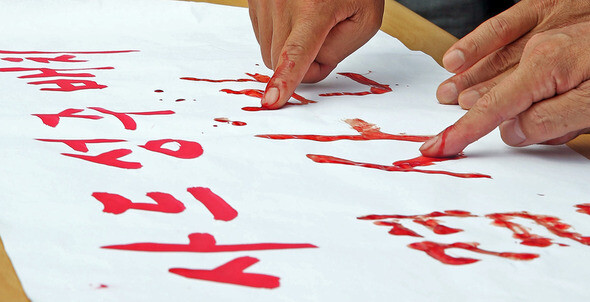
A two-minute drive up the hill brings you to a lookout point where you can see downtown Seongju spreading before you, with the Seongju County Office, the Seongju Branch of the Daegu District Court, and a cluster of schools, apartment buildings, and stores. Two minutes more brings you to the top of the hill, where an air force base is located.
Seongju locals call the base “Seongsan Battery.” With an area of 116,694 square meters, the base is equipped with surface-to-air Hawk missiles and radar equipment.
At 10:30 am on Wednesday, around 5,000 people - about 10% of the Seongju population - assembled for a rally against THAAD deployment, which was held in a park in Gyeongsan Village, Seongju Township.
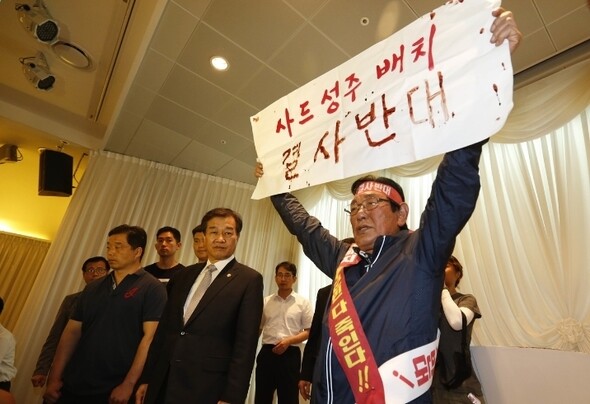
The total population of Seongju County is around 46,000, and about 10,800 of them are farmers. 57% of the county’s produce is melons (a yellow melon with white stripes mostly grown in Korea), while Seongju melons account for 70% of the entire country’s melon crop.
During the rally on Wednesday, Kim Hang-gon, mayor of Seongju County; Bae Jae-man, speaker of the Seongju County legislature; and Lee Jae-bok, chair of the emergency committee, wrote a letter in their own blood expressing their opposition to THAAD’s deployment in Seongju. On July 12, the three men started a hunger strike in protest of their county’s selection for THAAD.
“We’re just dumbfounded that they announced Seongju’s selection today without holding a single hearing or presentation for residents,” said Lee Il-woong, one of the residents at the rally, in a dejected voice.
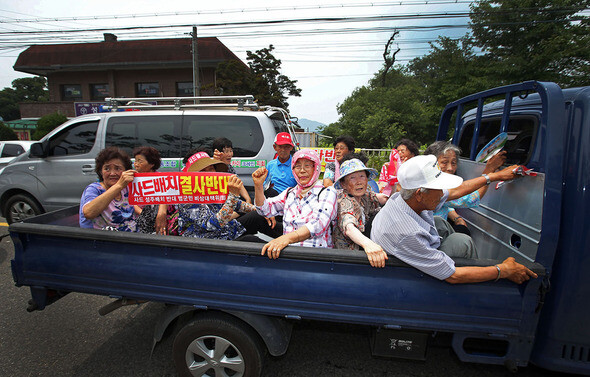
Lee, 48, who lives in Yongheung Village, Daega Township, grows melons on an organic farm in Seongju County. As the eldest son in his family, Lee inherited the Korean farm from his father.
“Deploying THAAD is not a question of compensation; it’s a question of whether or not they’re going to ruin land where farmers have been living for generations,” Lee said.
“We don’t understand how the central government can arbitrarily make this kind of decision without asking for residents’ consent,” said Kim Hang-gon, during the rally. “This is deplorable, and we’ll keep fighting until we achieve our goals.”
After the rally ended around 11:30 am on Wednesday, Kim and other residents boarded five charter buses and headed to the Defense Ministry, located in the Yongsan district of Seoul. The residents presented the letter written in blood to the Ministry and lodged a complaint about the deployment of THAAD in Seongju.
By Heo Seung, staff reporter
Please direct questions or comments to [english@hani.co.kr]

Editorial・opinion
![[Column] Park Geun-hye déjà vu in Yoon Suk-yeol [Column] Park Geun-hye déjà vu in Yoon Suk-yeol](https://flexible.img.hani.co.kr/flexible/normal/500/300/imgdb/original/2024/0424/651713945113788.jpg) [Column] Park Geun-hye déjà vu in Yoon Suk-yeol
[Column] Park Geun-hye déjà vu in Yoon Suk-yeol![[Editorial] New weight of N. Korea’s nuclear threats makes dialogue all the more urgent [Editorial] New weight of N. Korea’s nuclear threats makes dialogue all the more urgent](https://flexible.img.hani.co.kr/flexible/normal/500/300/imgdb/original/2024/0424/7317139454662664.jpg) [Editorial] New weight of N. Korea’s nuclear threats makes dialogue all the more urgent
[Editorial] New weight of N. Korea’s nuclear threats makes dialogue all the more urgent- [Guest essay] The real reason Korea’s new right wants to dub Rhee a founding father
- [Column] ‘Choson’: Is it time we start referring to N. Korea in its own terms?
- [Editorial] Japan’s rewriting of history with Korea has gone too far
- [Column] The president’s questionable capacity for dialogue
- [Column] Are chaebol firms just pizza pies for families to divvy up as they please?
- [Column] Has Korea, too, crossed the Rubicon on China?
- [Correspondent’s column] In Japan’s alliance with US, echoes of its past alliances with UK
- [Editorial] Does Yoon think the Korean public is wrong?
Most viewed articles
- 1‘We must say no’: Seoul defense chief on Korean, USFK involvement in hypothetical Taiwan crisis
- 2Will NewJeans end up collateral damage in internal feud at K-pop juggernaut Hybe?
- 3[Column] Park Geun-hye déjà vu in Yoon Suk-yeol
- 4Why Korea shouldn’t welcome Japan’s newly beefed up defense cooperation with US
- 5Thursday to mark start of resignations by senior doctors amid standoff with government
- 6N. Korean hackers breached 10 defense contractors in South for months, police say
- 7[Guest essay] The real reason Korea’s new right wants to dub Rhee a founding father
- 8[Column] ‘Choson’: Is it time we start referring to N. Korea in its own terms?
- 9Kim Jong-un expressed ‘satisfaction’ with nuclear counterstrike drill directed at South
- 10[Editorial] New weight of N. Korea’s nuclear threats makes dialogue all the more urgent